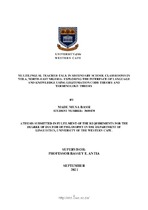Multilingual teacher-talk in secondary school classrooms in Yola, North-East Nigeria: Exploring the interface of language and knowledge using legitimation code theory and terminology theory
| dc.contributor.advisor | Antia, Bassey E. | |
| dc.contributor.author | Bassi, Madu Musa | |
| dc.date.accessioned | 2022-01-26T08:26:22Z | |
| dc.date.issued | 2021 | |
| dc.identifier.uri | http://hdl.handle.net/11394/8653 | |
| dc.description | Philosophiae Doctor - PhD | en_US |
| dc.description.abstract | It has been noted by Lin (2013) that studies on multilingual talk, as illustrated by code switching in the classroom, have been repetitive and descriptive, and have for a while not been underpinned by substantially new or different questions (Lin, 2013:15). First, many of the studies in the literature have, for instance, concluded that there is a functional allocation of languages (FAL) in multilingual classroom teacher talk (e.g. Baker, 2012; Martin, 1996; Probyn, 2006, 2014; Jegede, 2012; Modupeola, 2013; Salami, 2008), such that language „a‟ is used for presentational knowledge, and language „b‟ is used for explanatory knowledge, and these claims have not been subjected to sustained scrutiny. Secondly, codeswtiching and translanguaging increasingly have been the dominant and exclusive frameworks used, and this has limited the kinds of insights that can be obtained or the kinds of questions that can be posed. | en_US |
| dc.language.iso | en | en_US |
| dc.publisher | University of Western Cape | en_US |
| dc.subject | Classroom discourses | en_US |
| dc.subject | Translanguaging | en_US |
| dc.subject | Multilingual classroom teacher-talk | en_US |
| dc.subject | Knowledge profiles | en_US |
| dc.subject | Nigeria | en_US |
| dc.title | Multilingual teacher-talk in secondary school classrooms in Yola, North-East Nigeria: Exploring the interface of language and knowledge using legitimation code theory and terminology theory | en_US |
| dc.rights.holder | University of Western Cape | en_US |
| dc.description.embargo | 2024 |

